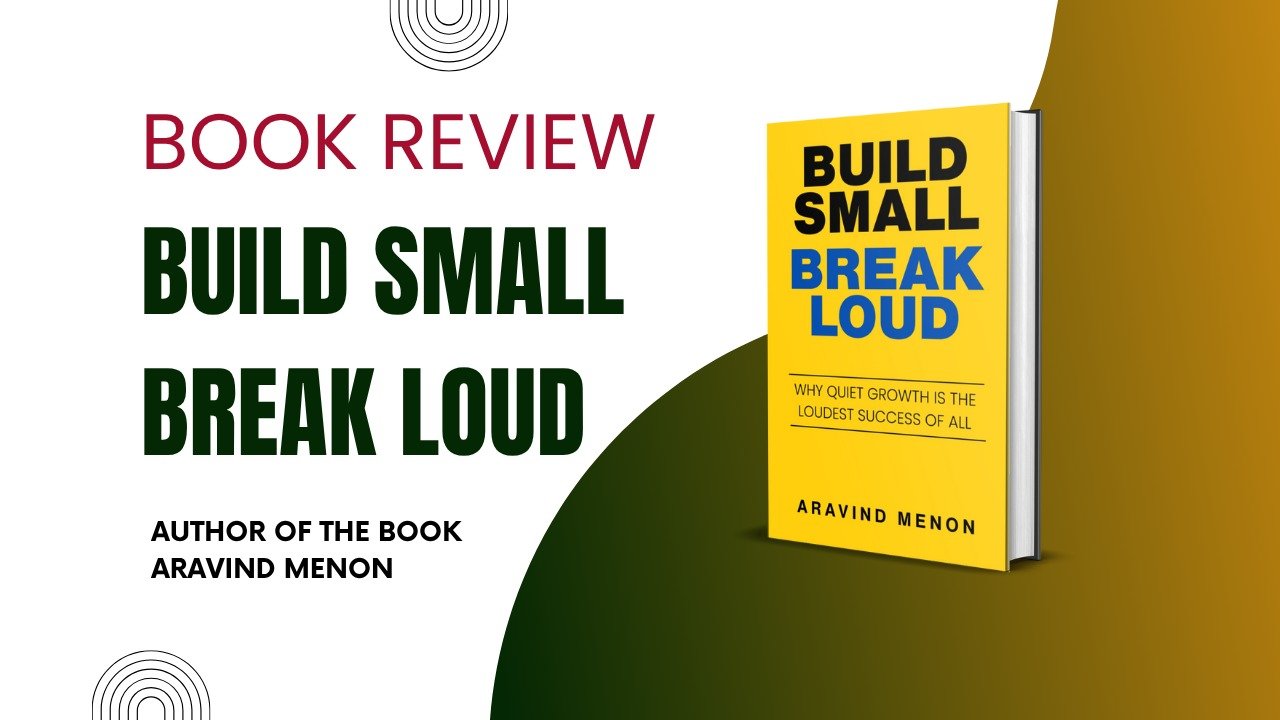Build Small Break Loud
By Aravind Menon
Publihser: Evincepub Publishing
In Build Small, Break Loud, Arvind Menon delivers a refreshing antidote to the startup world’s obsession with overnight success, viral fame, and billion-dollar valuations. Published in June 2025 by Evincepub Publishing, this debut book is a compelling blend of personal narrative, practical advice, and real-world insights drawn from Menon’s journey as a self-taught entrepreneur and the founder of Socium, a marketing agency focused on early-stage startups. Through candid storytelling and conversations from his podcast, The Business Couch Show, Menon crafts a manifesto for founders who feel invisible, underfunded, or overwhelmed by the pressure to “go big or go home.” At 500-800 words, this review explores the book’s strengths, weaknesses, and its place in the entrepreneurial literature landscape.
Menon’s central thesis is encapsulated in the book’s title: success doesn’t require scale or spectacle—it demands quiet, consistent, and authentic growth. The book is divided into two parts. Part One, “My Startup Truths,” chronicles Menon’s own entrepreneurial evolution, from failed ventures in automotive tech and marketing to the slow, deliberate rise of Socium. Part Two, “The Business Couch Show Conversations,” features stories from other founders, offering diverse perspectives on building businesses with grit and purpose. This structure effectively balances Menon’s personal insights with external voices, creating a relatable and multifaceted narrative.
One of the book’s greatest strengths is its raw honesty. Menon doesn’t shy away from his failures—ventures that “didn’t survive long enough to matter” or pitches that fell flat. In chapters like “The Startup You’ll Never Hear About” and “Why It’s Okay to Suck at First,” he normalizes the unglamorous “Phantom Phase” of entrepreneurship, where doubt, loneliness, and invisible effort dominate. His vulnerability is disarming, making the book a safe space for founders who feel like they’re falling behind. Menon’s mantra—“You don’t need to be big to be brave”—resonates deeply, challenging the startup culture’s fixation on scale and validation.
The book’s practical advice is another highlight. Menon distills lessons from his failures into actionable insights, such as the dangers of chasing investor funding too early (“The Toxic Trap of Taking Money Too Early”) or the importance of building a brand before designing a logo (“Why Brand Is Everything”). His emphasis on micro-wins—small, meaningful milestones like a first paying client or an honest piece of feedback—offers a refreshing counterpoint to the startup world’s obsession with vanity metrics like follower counts or funding rounds. These chapters are particularly valuable for early-stage founders navigating the messy, unglamorous realities of building a business.
Part Two amplifies the book’s impact by showcasing real founders from The Business Couch Show. From Raju’s logistics-turned-travel venture to Smitha Krishnamurthy’s sustainable real estate project in Ooty, these stories highlight diverse industries and challenges. Each episode-turned-chapter is a masterclass in resilience, with key takeaways neatly summarized for readers. For example, Amit’s doorstep diesel delivery service underscores the power of solving small frustrations, while Deepti’s Diva Squad illustrates how community-building can drive impact. These narratives reinforce Menon’s core message: success is personal, incremental, and rooted in authenticity.
However, the book is not without flaws. The OCR-extracted text reveals occasional formatting issues and typographical errors (e.g., “Secium” instead of “Socium” or repetitive phrases like “They didn’t just ‘in’ my books”). While these may stem from the document’s digitization, they can distract from the reading experience. Additionally, some chapters, particularly in Part One, feel repetitive, revisiting themes like failure and self-doubt without always adding new depth. The book could benefit from tighter editing to streamline these sections and enhance narrative flow.
Another critique is the book’s heavy reliance on Menon’s personal lens. While his story is compelling, it occasionally overshadows the broader applicability of his advice. For instance, his focus on podcast marketing as a niche feels specific to his journey and may not resonate with founders in unrelated fields. Including more diverse strategies for brand-building could broaden the book’s appeal.
Despite these shortcomings, Build Small, Break Loud stands out for its authenticity and relatability. Menon’s conversational tone, paired with his refusal to glorify entrepreneurship, makes the book a grounded companion for founders who feel overlooked. It’s not a get-rich-quick guide—Menon explicitly states it “won’t make you rich”—but a thoughtful exploration of how to build a business with soul. Its emphasis on slow, value-driven growth aligns with modern entrepreneurial trends that prioritize sustainability over hype.
In the crowded genre of startup literature, Build Small, Break Loud carves a unique niche. It’s less polished than books like The Lean Startup by Eric Ries but more intimate, offering a raw, human perspective that resonates with underdog founders. Priced at Rs. 499 and available on Amazon, Flipkart, and Evincepub.com, it’s an accessible read for aspiring entrepreneurs, particularly in India’s burgeoning startup ecosystem. Menon’s work reminds us that the loudest success often comes from the quietest beginnings—a message that’s both timely and timeless.
Buy on Amazon: https://www.amazon.in/Build-Small-Break-Aravind-Menon/dp/9363558533



